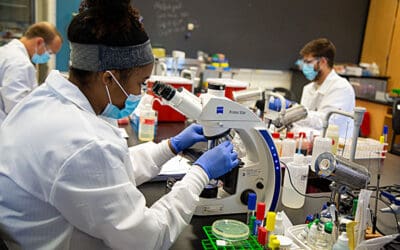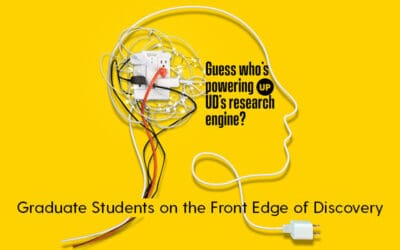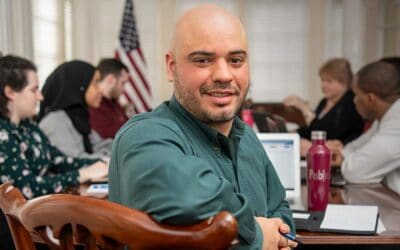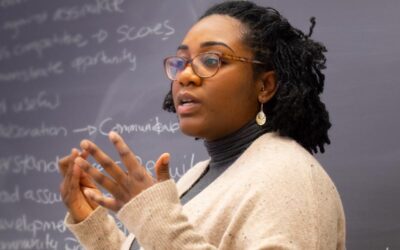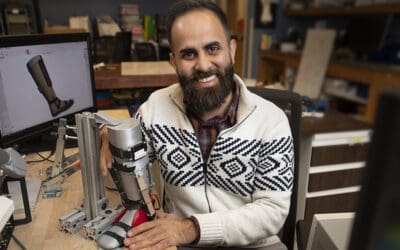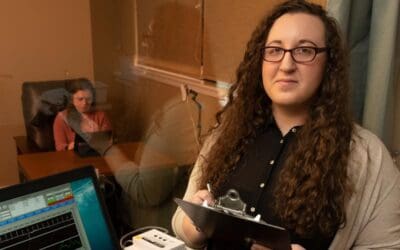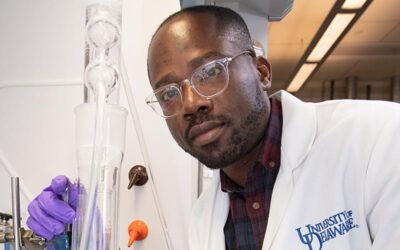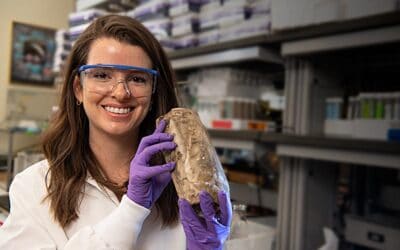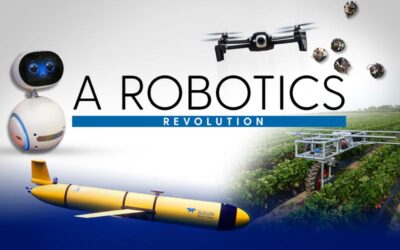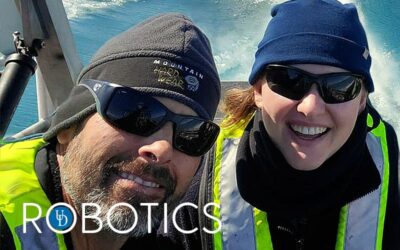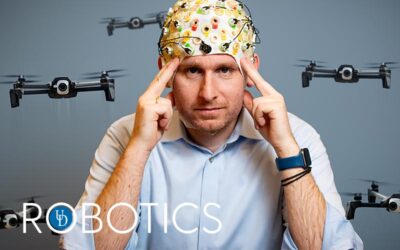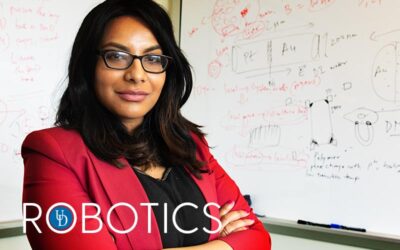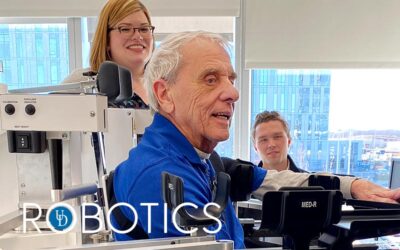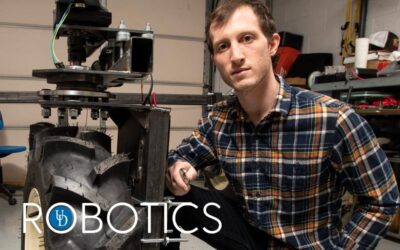UD ROBOTICS
Creative approaches to teaching tough topics
Just because children have grown up with internet-enabled devices and interactive technologies like Siri, Google and Alexa, does not mean that children are adept at understanding how to be safe online.
That is why University of Delaware researchers are leveraging an emerging technology known as social robots to test news ways to deliver cybersecurity training in the classroom. Pre-pandemic photo by Evan Krape
Researchers leverage social robots to teach children cybersecurity
by Karen Roberts
Gone are the days of looking something up in an encyclopedia or, worse (gasp!), via a library’s Dewey decimal system. No more do children sit at the family computer to access the internet.
Instead, children of all ages walk around with portable computers, mobile phones, iPods and other connected technology. Parents might even call these electronic devices their child’s “handheld life jacket.”
Just because children have grown up with internet-enabled devices and interactive technologies like Siri, Google and Alexa, however, does not mean that children are adept at understanding how to be safe online.
That is why University of Delaware researchers are leveraging an emerging technology known as social robots to test new ways to deliver cybersecurity training in the classroom.
The National Science Foundation-funded work is designed to complement, rather than replace, teacher instruction. The project is a collaborative effort by Chrystalla Mouza, Distinguished Professor in Teacher Education, and Tia Barnes, assistant professor of human development, in UD’s College of Education and Human Development (CEHD); and Chien-Chung Shen, professor of computer and information sciences in the College of Engineering.
The project leverages Zenbo, an off-the-shelf social robot, to deliver cybersecurity lessons by reading children familiar stories, such as Little Red Riding Hood, that have been creatively adapted for the digital age by the UD research team. As Zenbo reads the preprogrammed stories, the robot pauses periodically to solicit the children’s input about what Red Riding Hood should do next.
“The checkpoints reinforce positive behaviors and create teachable moments for when children make mistakes,” said Mouza, an expert in using technology in the classroom.
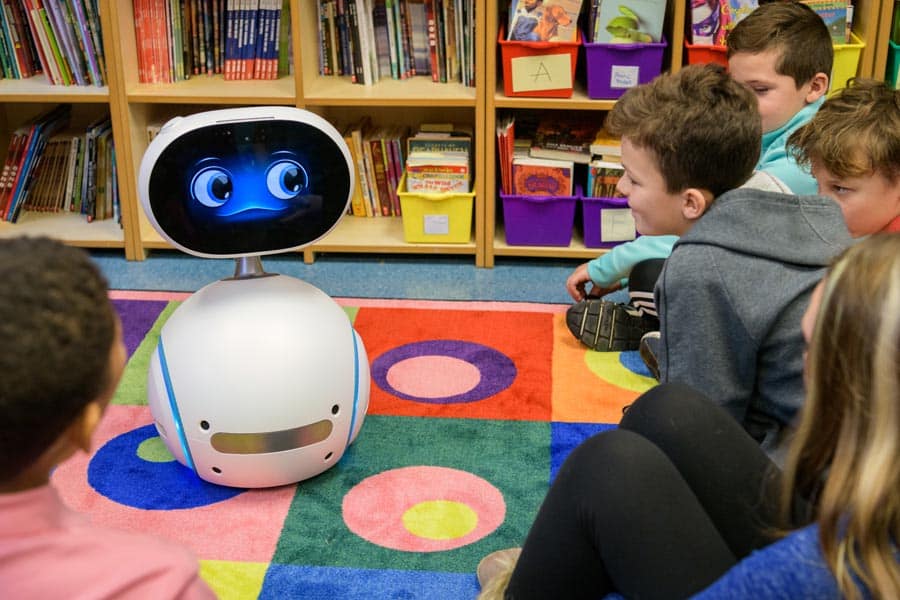
ABOVE: University of Delaware researchers are leveraging an emerging technology known as social robots to test news ways to deliver cybersecurity training in the classroom. The NSF-funded project is a collaborative effort by Chrystalla Mouza, Distinguished Professor in Teacher Education, and Tia Barnes, assistant professor of human development, in UD’s College of Education and Human Development; and Chien-Chung Shen, professor of computer and information sciences in the College of Engineering. Pre-pandemic photo by Evan Krape

ABOUT CHRYSTALLA
Chrystalla Mouza is Distinguished Professor of Teacher Education and director of the School of Education at the University of Delaware. She earned an Ed.D., M.Ed, and M.A. in Instructional Technology and Media from Teachers College, Columbia University and completed post-doctoral work at the Educational Testing Service (ETS). Specializing in educational technology, Mouza has expertise in the learning sciences including teacher learning, applications of technology in K-12 classrooms, and teaching and learning outcomes in ubiquitous and mobile computing environments.

ABOUT CHIEN-CHUNG
Chien-Chung Shen is a professor of computer and information sciences in the College of Engineering. He has a background in wireless communications, particularly mobile and sensor networks. Shen earned his doctoral degree in computer science at University of California Los Angeles.

ABOUT TIA
Tia Barnes is an assistant professor of human development and family sciences in UD’s College of Education and Human Development. Her research focuses on social-emotional learning, culturally responsive pedagogy and special education. Barnes earned a Master of Education and a doctoral degree in special education from the University of Florida.

Increasingly connected kids
Children ages 8 to 12 years old spend approximately six hours per day online, according to a 2015 Common Sense Media report. This number jumps to roughly nine hours daily after factoring in the amount of time students spend using technology in the classroom.
Mouza and Barnes took K-12 education standards related to computing and digital citizenship, including online safety, security and privacy, into account when developing the interactive stories. Digital citizenship focuses on online safety and the ethical and responsible use of the internet.
Shen and Yan-Ming Chiou, a computer science doctoral student with an interest in collaborative learning with interactive digital media, programmed the UD-developed stories, questions and responses into the social robot.
While the adaptation of Little Red Riding Hood focuses on the topic of phishing, Barnes also penned an original story called Captain Cyber that introduces friends James and Louisa who are inadvertently whisked into cyberspace while playing an online mobile game. There the children meet Captain Cyber, a cyber superhero who teaches them about identifying phishing sites and password safety.
The researchers envision the social robot as a part of a teacher’s overall strategy and lesson plan. Barnes hopes Zenbo can be leveraged to augment social emotional classroom instruction for children with disabilities. For example, a teacher might employ Zenbo to help children with autism or emotional learning difficulties practice social skills and explicitly experience social situations that they might encounter in real life.
Future iterations of the UD project could expand beyond social robots to include virtual reality (VR). This would enable children to not only learn from the stories, but to become characters within the virtual environment and role play the story using VR goggles, possibly even helping to teach their peers.
This work is funded through a grant from the National Science Foundation.
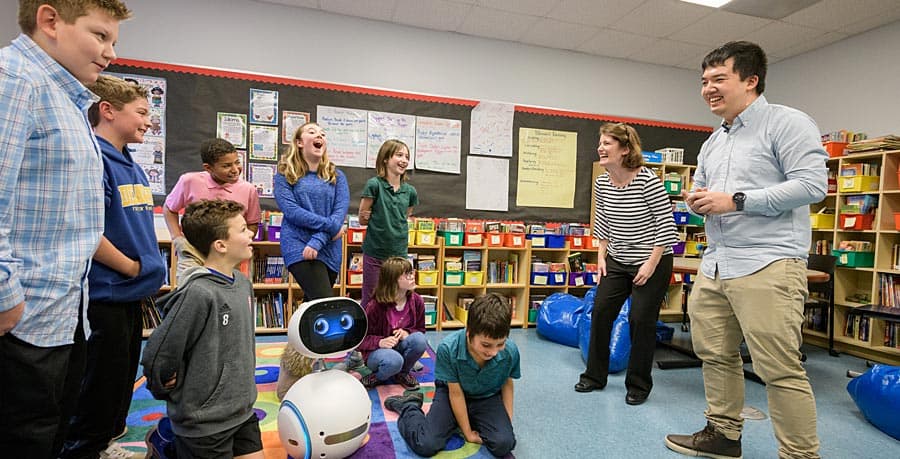
ABOVE: Fifth graders at The College School, located on UD’s Newark Campus, watch Zenbo the social robot, while doctoral student Yan-Ming Chiou guides the conversation and Laurie Drumm, TCS master teacher and technology coordinator, looks on. Pre-pandemic photo by Evan Krape
A UD Robotics Revolution
This special section of our digital magazine highlights an autonomous revolution taking place at UD.
MORE STORIES
From the Vice President for Research, Scholarship and Innovation: Moving Forward
The UD research community continues to navigate COVID-19, with health and safety the highest priority. In spite of hardships, we’re facing the pandemic with vigilance and resilience.
News Briefs
Check out our COVID-19 research, a virtual visit with the editor-in-chief of Science, and undergrads at work on the Frontiers of Discovery.
Honors: Celebrating Excellence
UD faculty and students have won major recognition for their expertise and contributions.
Guess Who’s Powering Up UD’s Research Engine?
This issue of the University of Delaware Research magazine introduces you to a critical creative force at UD — our graduate students and postdoctoral researchers. Their ingenuity is lighting new routes to discovery and solutions.
Front Edge of Discovery: Strengthening democracy for a better world
It all began with a Joseph Conrad novel. Doctoral student Pablo McConnie-Saad discusses his journey to better understand democracy, as the first Whittington Graduate Fellow at the Biden Institute.
Front Edge of Discovery: Developing resilient Black girls
Doctoral student and Graduate Scholar Nefetaria Yates is examining school discipline and the tactics Black girls have developed for dealing with the pressures they face. Her ultimate goal is to elevate voices that have been silenced.
Front Edge of Discovery: Helping children move
Entrepreneur Ahad Behboodi wants to see kids with cerebral palsy move more freely. He plans to commercialize a robotic foot device with the power to help them.
Front Edge of Discovery: A clinical science approach
Lexie Tabachnick, in her fifth year of doctoral studies, helps to mentor other grad students and undergraduates while she studies the powerful impact a UD-developed family intervention program is having on vulnerable kids.
Front Edge of Discovery: Beyond the hands of a potter
Sanchita Balachandran, associate director of Johns Hopkins Archaeological Museum and doctoral student in preservation studies at UD, is uncovering the forgotten makers of ancient Greek ceramics, and in so doing, changing our understanding of the past.
Front Edge of Discovery: Changing the world, one food waste at a time
Elvis Ebikade thinks potato peels hold a lot of promise. He’s working on converting the food waste to valuable chemicals and fuels that can power an environmentally-friendly future.
Front Edge of Discovery: The thing about permafrost is…
As a postdoctoral researcher, Liz Coward collected samples of permafrost from the icy walls of a research tunnel in Alaska to study the carbon stored within it.
A Robotics Revolution
Researchers at the University of Delaware are leveraging robotic systems to gain traction on tough problems. Learn how they are driving forward transformative solutions in agriculture, precision medicine, health care, cybersecurity, marine ecology and more.
UD Robotics: Antarctic food webs
University of Delaware researchers Matthew Oliver and Katherine Hudson think that some biological hotspots in Antarctica may operate less like local farms and more like grocery stores. If they are correct, it could provide new information about how this ecosystem will be affected under climate change.
UD Robotics: Robots these days!
Brain-swarm technology is meant to connect minds and machines. For Associate Professor Panos Artemiadis such robotics research has one purpose: To make life and work better for humans.
UD Robotics: Meet me on the cutting edge
Sambeeta Das is forging into an exciting world you can see only with high-powered microscopes, where sci-fi meets reality. Welcome to the world of microrobots!
UD Robotics: Allies in Overcoming Stroke
Stroke is a leading cause of long-term disability, but UD Professor Jennifer Semrau is working to change that. With the help of a robot, she’s uncovering a critical sixth sense that gets sidelined with stroke.
UD Robotics: Startup with Roots
Adam Stager is working on chemical-free ways to help strawberry farmers improve yield using an autonomous field robot.
A Jewish Oral History
A class helps preserve the precious stories of a little-documented time in Jewish life.
Test Your Knowledge: Getting Back to Nature
To reduce stress and strengthen our immune systems, experts often point us to the outdoors. So let’s get moving! There’s lots to see and hear, absorb and appreciate in nature.


